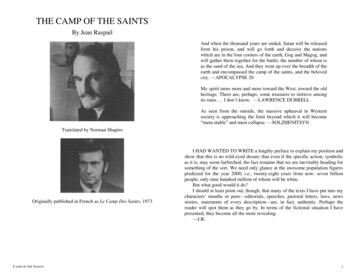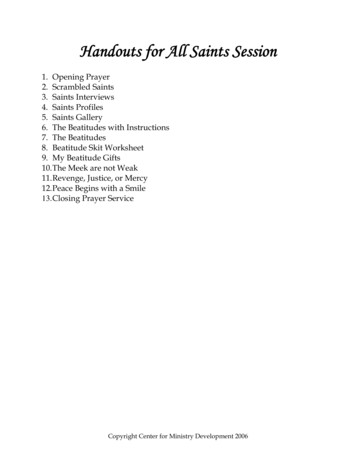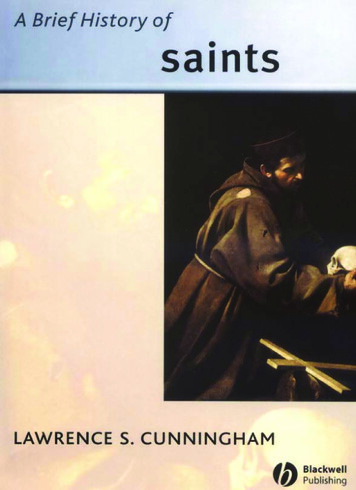
Transcription
THE CAMP OF THE SAINTSBy Jean RaspailAnd when the thousand years are ended, Satan will be releasedfrom his prison, and will go forth and deceive the nationswhich are in the four corners of the earth, Gog and Magog, andwill gather them together for the battle; the number of whom isas the sand of the sea. And they went up over the breadth of theearth and encompassed the camp of the saints, and the belovedcity. —APOCALYPSE 20My spirit turns more and more toward the West, toward the oldheritage. There are, perhaps, some treasures to retrieve amongits ruins I don’t know. —LAWRENCE DURRELLAs seen from the outside, the massive upheaval in Westernsociety is approaching the limit beyond which it will become“meta-stable” and must collapse. —SOLZHENITSYNTranslated by Norman ShapiroOriginally published in French as Le Camp Des Saints, 1973CAMP OF THE SAINTSI HAD WANTED TO WRITE a lengthy preface to explain my position andshow that this is no wild-eyed dream; that even if the specific action, symbolicas it is, may seem farfetched, the fact remains that we are inevitably heading forsomething of the sort. We need only glance at the awesome population figurespredicted for the year 2000, i.e., twenty-eight years from now: seven billionpeople, only nine hundred million of whom will be white.But what good would it do?I should at least point out, though, that many of the texts I have put into mycharacters’ mouths or pens—editorials, speeches, pastoral letters, laws, newsstories, statements of every description—are, in fact, authentic. Perhaps thereader will spot them as they go by. In terms of the fictional situation I havepresented, they become all the more revealing.—J.R.1
OneThe old professor had a rather simple thought. Given the wholly abnormalconditions, he had read, and reasoned, and even written too much—versed ashe was in the workings of the mind—to dare propose anything, even to himself,but the most banal of reflections, worthy of a schoolboy’s theme. It was alovely day, warm but not hot, with a cool spring breeze rolling gently andnoiselessly over the covered terrace outside the house. His was one of the lasthouses up toward the crest of the hill, perched on the rocky slope like anoutpost guarding the old brown-hued village that stood out above the landscape,towering over it all, as far as the tourist resort down below; as far as thesumptuous boulevard along the water, with its green palms, tips barely visible,and its fine white homes; as far as the sea itself, calm and blue, the rich man’ssea, now suddenly stripped of all the opulent veneer that usually overspread itssurface—the chrome-covered yachts, the muscle-bulging skiers, the goldskinned girls, the fat bellies lining the decks of sailboats, large but discreet—and now, stretching over that empty sea, aground some fifty yards out, theincredible fleet from the other side of the globe, the rusty, creaking fleet that theold professor had been eyeing since morning. The stench had faded away atlast, the terrible stench of latrines, that had heralded the fleet’s arrival, likethunder before a storm. The old man took his eye from the spyglass, movedback from the tripod. The amazing invasion had loomed up so close that italready seemed to be swarming over the hill and into his house. He rubbed hisweary eye, looked toward the door. It was a door of solid oak, like somedeathless mass, jointed with fortress hinges. The ancestral name was carved insomber wood, and the year that one of the old man’s forebears, in uninterruptedline, had completed the house: 1673. The door opened out on the terrace fromthe large main room that served as his library, parlor, and study, all in one.There was no other door in the house. The terrace, in fact, ran right to the road,down five little steps, with nothing like a gate to close them off, open to anyand every passerby who felt like walking up and saying hello, the way they didso often in the village. Each day, from dawn to dusk, that door stood open. Andon this particular evening, as the sun was beginning to sink down to its dailydemise, it was open as well—a fact that seemed to strike the old man for thevery first time. It was then that he had this fleeting thought, whose utterbanality brought a kind of rapturous smile to his lips: “I wonder,” he said tohimself, “if, under the circumstances, the proverb is right, and if a door reallyhas to be open or shut ”Then he took up his watch again, eye to glass, to make the most of thesun’s last, low-skimming rays, as they lit the unlikely sight one more timebefore dark. How many of them were there, out on those grounded wrecks? Ifthe figures could be believed—the horrendous figures that each terse newsbulletin had announced through the day, one after another—then the decks andholds must be piled high with layer on layer of human bodies, clustered inCAMP OF THE SAINTSheaps around smokestacks and gangways, with the dead underneath supportingthe living, like one of those columns of ants on the march, teeming with life ontop, exposed to view, and below, a kind of ant-paved path, with millions oftrampled cadavers. The old professor—Calgues by name—aimed his glass atone of the ships still lit by the sun, then patiently focused the lens until theimage was as sharp as he could make it, like a scientist over his microscope,peering in to find his culture swarming with the microbes that he knew all thetime must be there. The ship was a steamer, a good sixty years old. Her fivestacks, straight up, like pipes, showed how very old she was. Four of them werelopped off at different levels, by time, by rust, by lack of care, by chance—inshort, by gradual decay. She had run aground just off the beach, and lay there,listing at some ten degrees. Like all the ships in this phantom fleet, there wasn’ta light to be seen on her once it was dark, not even a glimmer. Everything musthave gone dead—boilers, generators, everything, all at once—as she ran tomeet her self-imposed disaster. Perhaps there had been just fuel enough for thisone and only voyage. Or perhaps there was no one on board anymore who feltthe need to take care of such things—or of anything else—now that the exodushad finally led to the gates of the newfound paradise. Old Monsieur Calguèstook careful note of all he saw, of each and every detail, unaware of theslightest emotion within him. Except, that is, for his interest; a prodigiousinterest in this vanguard of an antiworld bent on coming in the flesh to knock,at long last, at the gates of abundance. He pressed his eye to the glass, and thefirst things he saw were arms. As best he could tell, his range of visiondescribed a circle on deck ten yards or so in diameter. Then he started to count.Calm and unhurried. But it was like trying to count all the trees in the forest,those arms raised high in the air, waving and shaking together, all outstretchedtoward the nearby shore. Scraggy branches, brown and black, quickened by abreath of hope. All bare, those fleshless Gandhi-arms. And they rose up out ofscraps of cloth, white cloth that must have been tunics once, and togas, andpilgrims’ saris. The professor reached two hundred, then stopped. He hadcounted as far as he could within the bounds of the circle. Then he did somerapid calculation. Given the length and breadth of the deck, it was likely thatmore than thirty such circles could be laid out side by side, and that betweenevery pair of tangent circumferences there would be two spaces, more or lesstriangular in shape, opposite one another, vertex to vertex, each with an arearoughly equal to one-third of a circle, which would give a total of 30 10 40circles, 40 x 200 arms 8,000 arms. Or four thousand bodies! On this one deckalone! Now, assuming that they might be several layers thick, or at least no lessthick on each of the decks—and between decks and belowdecks too—then thefigure, astounding enough as it was, would have to be multiplied by eight. Orthirty thousand creatures on a single ship! Not to mention the dead, floatinghere and there around the hull, trailing their white rags over the water, corpsesthat the living had been throwing overboard since morning. A curious act, all in2
all, and one not inspired by reasons of hygiene, to be sure. Otherwise, why waitfor the end of the voyage? But Monsieur Calgues felt certain he had hit on theone explanation. He believed in God. He believed in all the rest: eternal life,redemption, heavenly mercy, hope and faith. He believed as well, with firmconviction, that the corpses thrown out on the shores of France had reachedtheir paradise too to waft their way through it, unconstrained, forevermore.Even more blessed than the living themselves, who, throwing them into the sea,had offered their dead, then and there, the gift of salvation, joy, and all eternity.Such an act was called love. At least that was how the old professor understoodit.And so night settled in, but not until daylight had glimmered its last redrays once more on the grounded fleet. There were better than a hundred ships inall, each one caked with rust, unfit for the sea, and each one proof of themiracle that had somehow guided them, safe and sound, from the other side ofthe earth. All but one, that is, wrecked off the coast of Ceylon. They had linedup in almost mannerly fashion, one after the other, stuck in the sand or inamong the rocks, bows upraised in one final yearning thrust toward shore. Andall around, thousands of floating, white-clad corpses, that daylight’s last waveswere beginning to wash aground, laying them gently down on the beach, thenrolling back to sea to look for more. A hundred ships! The old professor felt ashudder well up within him, that quiver of exaltation and humility combined,the feeling we sometimes get when we turn our minds, hard as we can, tonotions of the infinite and the eternal. On this Easter Sunday evening, eighthundred thousand living beings, and thousands of dead ones, were making theirpeaceful assault on the Western World. Tomorrow it would all be over. Andnow, rising up from the coast to the hills, to the village, to the house and itsterrace, a gentle chanting, yet so very strong for all its gentleness, like a kind ofsingsong, droned by a chorus of eight hundred thousand voices. Long, long ago,the Crusaders had sung as they circled Jerusalem, on the eve of their last attack.And Jericho’s walls had crumbled without a fight when the trumpets soundedfor the seventh time. Perhaps when all was silent, when the chanting was finallystilled, the chosen people too would feel the force of divine displeasure. There were other sounds as well. The roar of hundreds of trucks. Sincemorning, the army had taken up positions on the Mediterranean beaches. Butthere in the darkness there was nothing beyond the terrace but sky and stars.It was cool in the house when the professor went inside, but he left the dooropen all the same. Can a door protect a world that has lived too long? Even amarvel of workmanship, three hundred years old, and one carved out of suchutterly respectable Western oak? There was no electricity. Obviously, thetechnicians from the power plants along the coast had fled north too, with allthe others, the petrified mob, turning tail and running off without a word, so asnot to have to look, not see a thing, which meant they wouldn’t have tounderstand, or even try. The professor lit the oil lamps that he always kept onCAMP OF THE SAINTShand in case the lights went out. He threw one of the matches into the fireplace.The kindling, carefully arranged, flashed up with a roar, crackled, and spread itslight and warmth over the room. Then he turned on his transistor, tuned all daylong to the national chain. Gone now the pop and the jazz, the crooning ladiesand the vapid babblers, the black saxophonists, the gurus, the smug stars ofstage and screen, the experts on health and love and sex. All gone from theairwaves, all suddenly judged indecent, as if the threatened West wereconcerned with the last acoustic image it presented of itself. Nothing butMozart, the same on every station. Eine kleine Nachtmusik, no less. And the oldprofessor had a kindly thought for the program director, there in his studio inParis. He couldn’t possibly see or know, and yet he had understood. For thoseeight hundred thousand singsong voices that he couldn’t even hear, he hadfound, instinctively, the most fitting reply. What was there in the world moreWestern than Mozart, more civilized, more perfect? No eight hundred thousandvoices could drone their chant to Mozart’s notes. Mozart had never written tostir the masses, but to touch the heart of each single human being, in his privateself. What a lovely symbol, really! The Western World summed up in itsultimate truth An announcer’s voice roused the old professor from hismusings:“The President of the Republic has been meeting all day at the ÉlyséePalace with government leaders. Also present, in view of the gravity of thesituation, are the chiefs of staff of the three branches of the armed forces, aswell as the heads of the local and state police, the prefects of the departments ofVar and Alpes-Maritimes, and, in a strictly advisory capacity, His Eminence theCardinal Archbishop of Paris, the papal nuncio, and most of the Westernambassadors currently stationed in the capital. At present the meeting is still inprogress. A government spokesman, however, has just announced that thisevening, at about midnight, the President of the Republic will go on the air withan address of utmost importance to the nation. According to reports reaching usfrom the south, all still seems quiet on board the ships of the refugee fleet. Acommuniqué from army headquarters confirms that two divisions have beendeployed along the coast in the face in the face of ” (The announcerhesitated. And who could blame him? Just what should one call thatnumberless, miserable mass? The enemy? The horde? The invasion? The ThirdWorld on the march?) “ in the face of this unprecedented incursion (There!Not too bad at all!) “ and that three divisions of reinforcements are headingsouth at this moment, despite considerable difficulty of movement. In anothercommuniqué, issued not more than five minutes ago, army chief of staffColonel Dragasès has reported that troops under his command have begunsetting fire to some twenty immense wooden piles along the shore, in order to (Another hesitation. The announcer seemed to gasp. The old professor eventhought he heard him mutter “My God!”) “ in order to burn the thousands ofdead bodies thrown overboard from all the ships ”3
And that was all. A moment later, with hardly a break, Mozart was back,replacing those three divisions hurtling southward, and the score of funeralpyres that must have begun to crackle by now in the crisp air down by thecoast. The West doesn’t like to burn its dead. It tucks away its cremation urns,hides them out in the hinterlands of its cemeteries. The Seine, the Rhine, theLoire, the Rhône, the Thames are no Ganges or Indus. Not even theGuadalquivir and the Tiber. Their shores never stank with the stench of roastingcorpses. Yes, they have flowed with blood, their waters have run red, and manya peasant has crossed himself as he used his pitchfork to push aside the humancarcasses floating downstream. But in Western times, on their bridges andbanks, people danced and drank their wine and beer, men tickled the fresh,young laughing lasses, and everyone laughed at the wretch on the rack, laughedin his face, and the wretch on the gallows, tongue dangling, and the wretch onthe block, neck severed—because, indeed, the Western World, staid as it was,knew how to laugh as well as cry—and then, as their belfreys called them toprayer, they would all go partake of their fleshly god, secure in the knowledgethat their dead were there, protecting them, safe as could be, laid out in rowsbeneath their timeless slabs and crosses, in graveyards nestled against the hills,since burning, after all, was only for devilish fiends, or wizards, or poor soulswith the plague. The professor stepped out on the terrace. Down below, theshoreline was lit with a score of reddish glows, ringed round with billows ofsmoke. He opened his binoculars and trained them on the highest of the piles,flaming neatly along like a wooden tower, loaded with corpses from bottom totop. The soldiers had stacked it with care, first a layer of wood, then a layer offlesh, and so on all the way up. At least some trace of respect for death seemedto show in its tidy construction. Then all at once, down it crashed, still burning,nothing now but a loathsome mass, like a heap of smoking rubble along thepublic way. And no one troubled to build the nice neat tower again. Bulldozersrolled up, driven by men in diving suits, then other machines fitted with greatjointed claws and shovels, pushing the bodies together into soft, slimy mounds,scooping a load in the air and pouring it onto the fire, as arms and legs andheads, and even whole cadavers overflowed around them and fell to the ground.It was then that the professor saw the first soldier turn and run, calling to mindyet another cliché, arms and legs flapping like a puppet on a string, in perfectpantomime of unbridled panic. The young man had dropped the corpse he wasdragging. He had wildly thrown down his helmet and mask, ripped off hissafety gloves. Then, hands clutched to temples, he dashed off, zigzag, like aterrified jackrabbit, into the ring of darkness beyond the burning pile. Fiveminutes more, and ten other soldiers had done the same. The professor closedhis binoculars. He understood. That scorn of a people for other races, theknowledge that one’s own is best, the triumphant joy at feeling oneself to bepart of humanity’s finest—none of that had ever filled these youngsters’ addledbrains, or at least so little that the monstrous cancer implanted in the WesternCAMP OF THE SAINTSconscience had quashed it in no time at all. In their case it wasn’t a matter oftender heart, but a morbid, contagious excess of sentiment, most interesting tofind in the flesh and observe, at last, in action. The real men of heart would betoiling that night, and nobody else. Just a moment before, as the nice youngman was running away, old Calguès had turned his glasses briefly on a figurethat looked like some uniformed giant, standing at the foot of the burning pile,legs spread, and hurling up each corpse passed over to him, one by one, with apowerful, rhythmic fling, like a stoker of yesteryear deep belowdecks, feedinghis boiler with shovelfuls of coal. Perhaps he too was pained at the sight, but ifso, his pain didn’t leave much room for pity. In fact, he probably didn’t think ofit at all, convinced that now, finally, the human race no longer formed one greatfraternal whole—as the popes, philosophers, intellects, politicos, and priests ofthe West had been claiming for much too long. Unless, that is, the oldprofessor, watching “the stoker” and his calm resolve—the one he called “thestoker” was really Colonel Dragasès, the chief of staff, up front to set his menan example—was simply ascribing to him his own ideas. That night, lovetoo was not of one mind. Man never has really loved humanity all of a piece—all its races, its peoples, its religions—but only those creatures he feels are hiskin, a part of his clan, no matter how vast. As far as the rest are concerned, heforces himself, and lets the world force him. And then, when he does, when thedamage is done, he himself falls apart. In this curious war taking shape, thosewho loved themselves best were the ones who would triumph. How manywould they be, next morning, still joyously standing their ground on the beach,as the hideous army slipped down by the thousands, down into the water, forthe onslaught by the living, in the wake of their dead? Joyously! That was whatmattered the most. A moment before, as he watched “the stoker,” the professorhad thought he could see him move his lips, wide open, as if he were singing.Yes, by God, singing! If even just the two of them could stand there and sing,perhaps they could wake up the rest from their deathly sleep. But no othersound came rising from the shore, no sound but the soft, foreboding chantwelling up out of eight hundred thousand throats.“Pretty cool, man, huh!” exclaimed a voice in the shadows.TwoNoiselessly, the young man had come up the five little steps from the roadand onto the terrace. Feet bare, hair long and dirty, flowered tunic, Hinducollar, Afghan vest.“I’ve just been down there,” he said. “Fantastic! I’ve been waiting fiveyears for something like this!”“Are you alone?”“So far. Except for the ones who were already here. But there’s lots moreon the way. They’re all coming down. And walking, too. All the pigs arepulling out and heading north! I didn’t see a single car in this direction! Man,4
they’re going to be bushed, but this is too good to miss. Going to smoke, andshoot dope, and walk all the way. Make it down here on their feet, not on theirbutts.”“Did you get a close look down there?”“Real close. Only not for long. I got smashed a couple of times. Somesoldier, with his gun. Like I was trash. But I saw a bunch of other soldierscrying. It’s great! I’m telling you, tomorrow this country’s going to besomething else. You won’t know it. It’s going to be born all over.”“Did you see the people on the boats?”“You bet I did!”“And you think you’re anything like them? Look, your skin is white.You’re a Christian, I imagine. You speak our language, you have our accent.You probably even have family hereabouts, don’t you?”“So what! My real family’s all the people coming off those boats. Here Iam with a million of my brothers, and sisters, and fathers, and mothers. Andwives if I want them. I’ll sleep with the first one that lets me, and I’ll give her ababy. A nice dark baby. And after a while I’ll melt into the crowd.”“Yes, you’ll disappear. You’ll be lost in that mass. They won’t even knowyou exist.”“Good! That’s just what I’m after. I’m sick of being a tool of the middleclass, and I’m sick of making tools of people just like me, if that’s what youmean by existing. My parents took off this morning. And my two sisters withthem. Afraid of getting raped, all of a sudden. They went and dressed up likeeveryone else. These real square clothes, I mean. Things they haven’t put on inyears, like neat little skirts, and blouses with buttons. So scared, you wouldn’tknow them. Well, they won’t get away. Nobody’s going to get away. Let themtry to save their ass. They’re finished, all of them. Man, you should have seenit! My father, with his arms full of shoes from his store, piling them into hisnice little truck. And my mother, bawling her head off, figuring out which onesto take, picking out the expensive ones and leaving the rest. And my sisters,already up front, huddling together and staring at me, scared to death, likemaybe I was the first one in line to rape them. And meanwhile I’m laughingand having myself a ball, like when my old man pulls down the grille in frontof the store and sticks the key in his pocket. ‘Listen,’ I told him, ‘a lot of goodthat’s going to do! I can open your door myself without a key. And I will,tomorrow. And you know what they’ll do with your goddamn shoes? They’llprobably use them to piss in. Or maybe they’ll eat them. Because they all gobarefoot!’ Then he gave me a look, and he spit on me. So I spit back and gothim in the eye with a big one. And that’s how we said good-bye.”“And what brings you here? Why this village? Why my house?”“I’m looting, that’s why. I sponged off society while it was alive, so nowthat it’s dead, I’m going to pick its bones. It’s a change. I like it. Becauseeverything’s dead. Except for the army, and you, and a few of my friends,CAMP OF THE SAINTSthere’s no one around for miles. So I’m looting, man. But don’t worry, I’m nothungry. I’ve already stuffed myself. And anyway, I don’t need much. Besides,everything’s mine now. And tomorrow I’m going to stand here and let themhave it all. I’m like a king, man, and I’m going to give away my kingdom.Today’s Easter, right? Well, this is the last time your Christ’s going to rise. Andit won’t do you any good this time, either, just like all the rest.”“I’m afraid I don’t follow“There’s a million Christs on those boats out there. And first thing in themorning they’re all going to rise. The million of them. So your Christ, all byhimself Well, he’s had it, see?”“Do you believe in God?”“Of course not!”“And those million Christs? Is that your own idea?”“No, but I thought it was kind of cool. For padre talk, I mean. I got it fromthis priest. One of those worker types from the wrong side of town. I ran intohim an hour ago. I was on my way up here, and he was running like crazy downthe hill. Not in rags or anything, but kind of weird. He kept stopping and liftinghis arms in the air, like the ones down there, and he’d yell out: ‘Thank you,God! Thank you!’ And then he’d take off again, down to the beach. They saythere’s more on the way.”“More what?”“More priests, just like him Say listen, man, I’m getting tired of you. Ididn’t come here to talk. Besides, you’re just a ghost. How come you’re stillaround?”“I want to hear what you have to say.”“You mean my bullshit interests you?”“Immensely.“Then I’ll tell you something: you’re through. Dried up. You keep thinkingand talking, but there’s no more time for that. It’s over. So beat it!”“Oh? I daresay ”“Listen. You and this house, you’re both the same. You look like you’veboth been around here for a thousand years.”“Since 1673, to be exact,” the old gentleman answered, smiling for the firsttime.“Three centuries, father to son. And always so sure of yourselves, so damnsure of everything. Man, that’s sick!”“Quite true. But I find your concern a trifle surprising. Perhaps you’re stillone of us after all. Perhaps just a little?”“Shut up before you make me puke! Maybe you’ve got a pretty house. Sowhat? And maybe you’re not a bad old guy. Smart, and refined, and everythingjust right. But smug, man, so sure of your place. So sure that you fit right in.With everything around you. Like this village of yours, with its twentygenerations of ancestors just like you. Twenty generations without a5
conscience, without a heart. What a family tree! And now here you are, the last,perfect branch. Because you are, you’re perfect. And that’s why I hate you.That’s why I’m going to bring them here, tomorrow. The grubbiest ones in thebunch. Here, to your house. You’re nothing to them, you and all you stand for.Your world doesn’t mean a thing. They won’t even try to understand it. They’llbe tired, man. Tired and cold. And they’ll build a fire with your big woodendoor. And they’ll crap all over your terrace, and wipe their hands on yourshelves full of books. And they’ll spit out your wine, and eat with their fingersfrom all that nice pewter hanging inside on your wall. Then they’ll squat ontheir heels and watch your easy cha4rs go up in smoke. And they’ll use yourfancy bedsheets to pretty themselves up in. All your things will lose theirmeaning. Your meaning, man. What’s beautiful won’t be, what’s useful they’lllaugh at, what’s useless they won’t even bother with. Nothing’s going to beworth a thing. Except maybe a piece of string on the floor. And they’ll fightover it, and tear the whole damn place apart. Yes, it’s going to betremendous! So go on, beat it. Fuck off!”“One moment, if I may. You told me there was no more time for thinkingand talking, yet you seem to be doing a good deal of both.”“I’m not thinking, man. I’m just telling you where I stand on things Ithought of long ago. I’m through thinking. So fuck off, you hear me?”“One last question. When they go smashing everything to bits, they won’tknow any better. But why you?”“Why? Because I’ve learned to hate all this. Because the conscience of theworld makes me hate all this, that’s why. Now fuck off! You’re beginning toget on my ass!”“If you insist. There’s really no point in staying. You’re not making verymuch sense. I’m sure you have an excellent brain, but I do think it’s been atrifle muddled. Someone has done a fine job. Well now, I’ll be on my way. Justlet me get my hat.”The old gentleman stepped inside. He came out a moment later with ashotgun.“What’s that for?” the young man asked.“Why, I’m going to kill you, of course! My world won’t live past morning,more than likely, and I fully intend to enjoy its final moments. And enjoy themI shall, more than you can possibly imagine! I’m going to live myself a secondlife. Tonight, right here. And I think it should be even better than the first. Ofcourse, since all of my kind have left, I intend to live it alone.”“And me?”“You? Why, you’re not my kind. We couldn’t be more unlike. Surely Idon’t want to ruin this one last night, this quintessential night, with someonelike you. Oh no, I’m going to kill you.”“You can’t. You won’t know how. I bet you’ve never killed anyone.”CAMP OF THE SAINTS“Precisely. I’ve always led a rather quiet life. A professor of literature wholoved his work, that’s all. No war ever called me to serve, and, frankly, thespectacle of pointless butchery makes me ill. I wouldn’t have made a very goodsoldier, I’m afraid. Still, had I been with Actius, once upon a time, I think Iwould have reveled in killing my share of Hun. And with the likes of CharlesMartel, and Godfrey of Bouillon, and Baldwin the Leper, I’m sure I would haveshown a certain zeal in poking my blade through Arab flesh. I might have fallenbefore Byzantium, fighting by Constantine Dragasès’s side. But God, what ahorde of Turks I would have cut down before I gasped my last! Besides, when aman is convinced of his cause, he doesn’t die quite so easily! See, there I am,springing back to life in the ranks of the Teutons, hacking the Slav to shreds.And there, leaving Rhodes with Villiers de l’Isle-Adam and his peerless littleba
THE CAMP OF THE SAINTS By Jean Raspail Translated by Norman Shapiro Originally published in French as Le Camp Des Saints , 1973 And when the thousand years are ended, Satan will be released from his prison, and will go forth and deceive the nations which are in the four corners of the earth, Gog and Magog, and .File Size: 1MB










